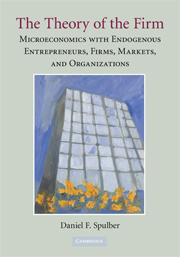 The Theory of the Firm
The Theory of the Firm Published online by Cambridge University Press: 05 June 2012
The firm is defined to be a transaction institution whose objectives differ from those of its owners. This separation is the key difference between the firm and direct exchange between consumers. Consumer organizations that generally fail to satisfy the separation criterion include groups of contracting individuals, clubs, workers' cooperatives, buyers' cooperatives, nonprofits, and basic partnerships. This chapter examines how separation provides the firm with capabilities that improve the efficiency of transactions in comparison to direct exchange.
The scope of the firm is the combination of the firm's market-making and organizational activities. The “intermediation hypothesis,” as set forth in the previous chapter, states that increases in consumer transaction costs relative to those of the firm lead to growth in the scope of the firm. This chapter examines in greater detail how firms address transaction costs through both markets and organizations. The major role that firms play in the contemporary economy suggests that firms possess substantial transaction cost advantages over direct exchange.
The discussion then reviews the “internalization hypothesis,” otherwise known as the “make-or-buy” choice, which suggests that firms address some types of transaction costs by vertical integration. This determines how the firm divides its scope between its market-making activities and organizational activities, and is complementary to the “intermediation hypothesis.”
To save this book to your Kindle, first ensure no-reply@cambridge.org is added to your Approved Personal Document E-mail List under your Personal Document Settings on the Manage Your Content and Devices page of your Amazon account. Then enter the ‘name’ part of your Kindle email address below. Find out more about saving to your Kindle.
Note you can select to save to either the @free.kindle.com or @kindle.com variations. ‘@free.kindle.com’ emails are free but can only be saved to your device when it is connected to wi-fi. ‘@kindle.com’ emails can be delivered even when you are not connected to wi-fi, but note that service fees apply.
Find out more about the Kindle Personal Document Service.
To save content items to your account, please confirm that you agree to abide by our usage policies. If this is the first time you use this feature, you will be asked to authorise Cambridge Core to connect with your account. Find out more about saving content to Dropbox.
To save content items to your account, please confirm that you agree to abide by our usage policies. If this is the first time you use this feature, you will be asked to authorise Cambridge Core to connect with your account. Find out more about saving content to Google Drive.